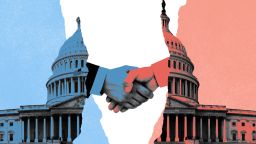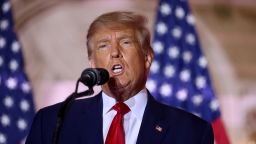Congressional Republicans have repeatedly blamed President Joe Biden and their Democratic counterparts for the surge in inflation and the rocky economy.
But though the GOP has captured control of the House in the midterm election, albeit by a very slim margin, there’s not much the party can do to quickly bring down prices and put the economy on more solid footing when it assumes power in January.
“It was really easy to criticize the economy and criticize inflation. But no one really had an agenda to do anything about it,” said Brian Riedl, senior fellow at the Manhattan Institute, a free market think tank, and former chief economist for Republican Sen. Rob Portman of Ohio. “I think ultimately, they’re going to be pointing fingers at each other while they wait for the Federal Reserve to do most of the heavy lifting.”
House Republican leaders provided some big-picture ideas of their economic plans in their legislative agenda, titled Commitment to America, which they released in September. Many are core GOP ideals: They promise to curb wasteful spending, reduce taxes and regulations, ramp up American energy production, expand US manufacturing and move supply chains away from China.
However, California Rep. Kevin McCarthy, who is in line to become House speaker next year, may have difficulty garnering enough support to pass any economic proposals with such a narrow majority, Riedl said. The caucus is currently split between economic nationalists, who want to increase tariffs, reduce immigration and crack down on trade, and free-market supporters, who champion spending cuts, tax reductions, free trade and less regulation.
The only significant overlap between the factions is their interest in increasing energy production, though that would not swiftly or significantly bring down the prices of oil, natural gas and gasoline, he said.
Stop Democrats’ spending proposals
There is one thing House Republicans can do that they believe will help the economy: Slam the brakes on Biden’s and congressional Democrats’ big spending proposals, which the GOP argues has caused inflation to soar.
“We’ll pursue an agenda focused on affordability,” Texas Rep. Kevin Brady, ranking member of the House Ways and Means Committee, told reporters Wednesday. “That means less government spending, taxes and regulation that is fueling higher prices, more made-in-America energy, more workers reconnected to their job and innovation that can reduce the drivers of inflation.”
Soon after Biden took office last year, Democrats passed a $1.9 trillion Covid-19 relief bill that provided another round of stimulus checks, extended generous unemployment benefits, temporarily beefed up the child tax credit and enhanced federal subsidies for Affordable Care Act coverage, among other measures. Over the summer, the party passed a $750 billion health care, tax and climate bill – a much smaller version of a $3.5 trillion package Democrats had originally hoped to push through.
Several other spending measures got bipartisan support, including a $1.2 trillion infrastructure package that passed last November and a bill that will invest more than $200 billion over five years to boost semiconductor chip manufacturing, which was approved over the summer.
It’s very hard to take all this money out of the system, so it just needs to work its way through, said Rohit Kumar, co-leader, Washington National Tax Services at PwC, and former deputy chief of staff for Senate Republican Leader Mitch McConnell. Most of the GOP’s economic policies are rooted in longer-term growth proposals, such as corporate tax incentives. In the short run, inflationary pressures will largely be handled by the Federal Reserve, though the GOP will seek to stop pouring more federal funds into the economy.
It’s possible the party will use the need to raise the debt ceiling sometime next year as leverage to force Biden and Democrats to curtail spending.
But if the economy does fall into a recession, cutting spending could make things worse, especially when the Federal Reserve is increasing interest rates, said Greg Valliere, chief US policy strategist at AGF Investments. Typically, providing targeted federal assistance to struggling Americans during downturns helps both them and the economy get back on their feet.
“This mood on Capitol Hill against spending is not designed, in my opinion, to help the economy,” he said. “I think it could weaken the economy.”
Economic improvement
Although prices for gas, food and other essentials remain high, inflation has cooled a bit in recent months. Wholesale prices rose by 8% in October from a year before, the smallest increase since July of last year, and the Consumer Price Index rose 7.7% for the year ending in October, the lowest annual inflation reading since January.
Meanwhile, Federal Reserve Vice Chair Lael Brainard said Monday that it could soon be time for the central bank to slow the pace of its rate increases. It has approved hikes of three-quarters of a percentage point at each of its last four meetings in an effort to curb inflation.
There’s no panacea for the nation’s economic and inflation woes, Valliere said.
“Everybody’s probably hoping that the economy heals by itself,” he said.







